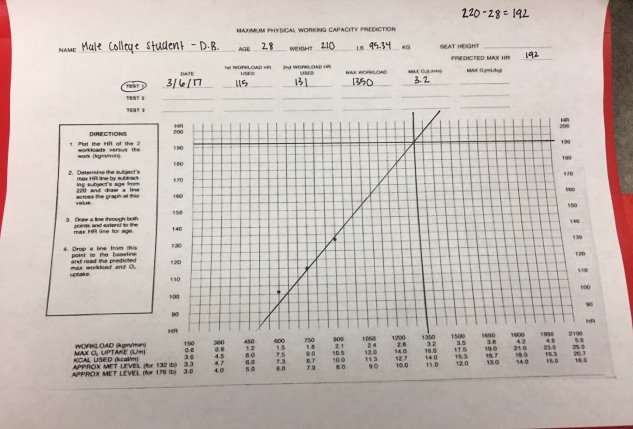Maximal versus Submaximal Oxygen Consumption | Results
| ✅ Paper Type: Free Essay | ✅ Subject: Biology |
| ✅ Wordcount: 834 words | ✅ Published: 08 Jun 2018 |
- Bree Dela Rosa
Results

Table 1. Estimated VO2 max versus the measured VO2 max of a 28-year-old male college student performing a YMCA Cycle Test.
|
Watts |
Heart Rate (HR) |
Estimated VO2 Max |
Measured VO2 Max |
|
|
Stage 1 |
50 |
82 |
||
|
Stage 2 |
100 |
103 |
||
|
Stage 3 |
125 |
115 |
||
|
Stage 4 Stage 5 Stage 6 Stage 7 Stage8 Stage 9 |
150 200 250 300 350 400 |
131 142 156 167 173 180 |
35.7 ml/kg/min |
52.1 ml/kg/min |
*HR = Heart Rate; VO2 = Oxygen Consumption
Male participant’s predicted VO2 max is 35.7 ml/kg/min and the observed value is 52.1 ml/kg/min. The predicted value was statistically not significant from the observed value, 16 ml/kg/min.
Questions
Was the estimated VO2max from the submaximal exercise significantly (more than 5 ml/kg/min) different from the measured at the end of the max test? What are some possible reasons for the difference?
The estimated VO2 max from the submaximal test was 35.7 ml/kg/min, and the measured VO2 max was 52.1 ml/kg/min on the gold standard, and it is statistically not significant from the estimated VO2 value of 16.4 ml/kg/min. One possible reason can mean that the predicted heart rate during the test, 180 beats per minute, was not near the actual max heart rate of 192 beats per minute.
Are there any assumptions that you are familiar of that you think that they have been or have not been met during the submaximal exercise test?
One assumption that was not met during the submaximal is that the male college student’s steady state heart rate was not measured during the test at each exercise work rate after three-minute increments. Also, the difference between the actual heart rate of 192 beats per minute and 180 beats per minute is not minimal. Lastly, I was not aware if the participant took any medication, consumed high caffeine such as coffee or soda, was ill, and possibly stressed within the last week which may have altered his heart rate.
Some assumptions that were met during the submaximal test were that there was a linear relationship between heart rate and work rate. The mechanical efficiency is the same for everyone because the participant was biking normally with his arms.
What are the reasons that you might choose a submaximal exercise test over a maximal exercise test and vice versa? Provide at least three advantages and disadvantages.
A submaximal and maximal test can be performed on either a treadmill or a cycle ergometer. A treadmill test is used to the exam for either running or walking, which requires no experience for participants. Be sure to consider your limitations as well. For example, if you recently suffered a heart attack and are obese, this may not be an option for you, and you must get cleared by your primary care provider. A cycle ergometer is one of the more common tests that individuals use that requires no specialized training at all, and the activity is not weight bearing. However, you need someone to administer the test for you.
Submaximal tests will help indicate the level of oxygen consumption, the measure of aerobic fitness, and the record of your heart rate response during bouts of an exercise. As intensity increases, your heart rate will increase as well. According to ACE (American Council of Exercise), one single session of exercise can provide an excellent representation to indicate your current state of fitness without the use of expensive equipment or technology. Also, the submaximal test can track your progress over time through a consistent workout program. This inexpensive test is prescribed most commonly by clinicians to help diagnose cardiovascular disease (CAD). If you want to calculate, your maximal heart rate, use the formula 220 – Age. Some disadvantages are that the small measurement can allow discrepancies in the results.
A maximal test would be used to measure the direct oxygen consumption and maximum heart rate and the amount of carbon dioxide you expend during the test. Also, your heart rate and blood pressure are being monitored by a technician or by an exercise physiologist, and sometimes a physician to supervise. One disadvantage to this test that it is the high cost of each test, time-consuming, and is used correctly to measure aerobic power in athletes.
Which one do you think is more applicable to a clinical population and why?
I would recommend using a submaximal test if an individual or client of mine wants to focus on endurance training. I think the submaximal test would be more applicable to people who suffer from cardiovascular disease and those who are not exposed to exercise that often. It would be more appropriate for the individual to know where he or she stands on the fitness spectrum before going straight into a vigorous activity. I can use a treadmill test to increase the elevation and or a bike test to increase resistance. The speed, on the other hand, remains constant throughout the duration of the test and heart rate is continually monitored after every incremental increase. The submaximal test stops when your heart rate reaches 85 percent of your max heart rate and or you feel like you cannot continue anymore.
Cite This Work
To export a reference to this article please select a referencing stye below:
Related Services
View allDMCA / Removal Request
If you are the original writer of this essay and no longer wish to have your work published on UKEssays.com then please click the following link to email our support team:
Request essay removal


